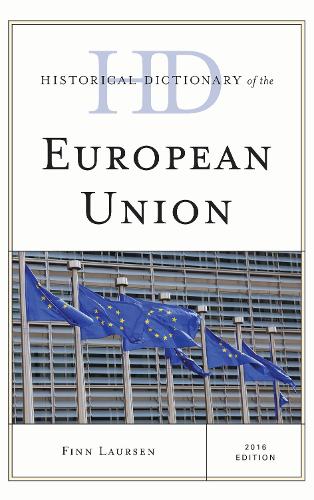
Historical Dictionary of the European Union
(Hardback)
Publishing Details
Historical Dictionary of the European Union
By (Author) Finn Laursen
Bloomsbury Publishing PLC
Rowman & Littlefield Publishers
30th October 2015
United States
Classifications
Tertiary Education
Non Fiction
Reference works
341.242203
Physical Properties
Hardback
370
Width 158mm, Height 238mm, Spine 31mm
685g
Description
The current European Union (EU) has existed since 1 November 1993. It emerged from the Treaty of Maastricht largely negotiated during 1991. But the history of European integration goes further back. The Schuman Declaration of 9 May 1950 led to the creation of the European Coal and Steel Community (ECSC) in 1951, and in 1957 the two Treaties of Rome created the European Economic Community (EEC) and the European Atomic Energy Community (EAEC or EURATOM), which started operating from 1 January 1958. For some years the EEC was often referred to as the Common Market. The Merger Treaty of 1965 (in force since 1967) created a single executive, the European Commission, and a single Council of Ministers. The three Communities from the beginning in 1958 shared the Parliamentary Assembly and European Court of Justice (ECJ). Although these Communities still had separate treaties, they were increasingly seen as the European Community (EC). This new edition of Historical Dictionary of the European Union has a chronology, an introductory essay, appendixes, and an extensive bibliography. The dictionary section has over 400 cross-referenced entries on important personalities, member states, internal policies, external relations, basic theories, treaties, and law. This book is an excellent access point for students, researchers, and anyone wanting to know more about the European Union.
Reviews
Because the previous edition of the Historical Dictionary of the European Union was written ten years ago (by different authors), much has changed in the Union and elsewhere, so there was certainly a need for this new one, which presents 380 entries of between 20 and 1000 words on its institutions or subordinate bodies, treaties, procedures, policies, personalities and technical terms, together with articles on its member states, other associated countries and international organisations. The EU presents peculiar difficulties to the compilers of reference works, owing to its uniquely complex structure and procedure, compared with those of a national state and the frequent opacity of its languagebut the author has the talent to explain them in a comparatively straightforward way. In the usual manner of this series, the main text is supplemented by a list of abbreviations and acronyms; a chronology from 1946 to the end of 2014; several maps showing the growth of the Union (and photographs of some of its leading personalities) and a long introduction amounting to a history of European integration and an analysis of its principles. * s *
Author Bio
Finn Laursen is a Visiting Professor at the University of Southern Denmark, Odense, and Adjunct Professor of Political Science at Dalhousie University, Halifax, Nova Scotia, Canada. He also holds an ad personam Jean Monnet Chair of EU Studies. Held the Canada Research Chair in EU Studies and directed the EU Centre of Excellence (EUCE) at Dalhousie University, Halifax, Nova Scotia, 2006-2013. Has written extensively on European integration, EU treaty reforms, EU as a Global Actor, federalism and comparative regional integration.
